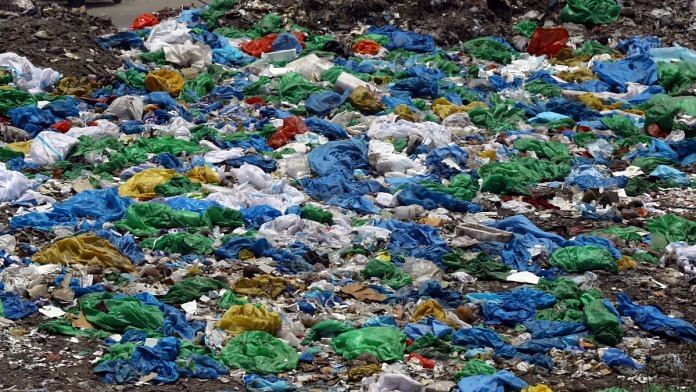The Biomedical Waste Management Rules, 2016, define biomedical waste as“any waste that is generated during the diagnosis, treatment or immunisation of human beings or animals or research activities pertaining thereto or in the production or testing of biological or in health camps.” Therefore, broadly, any waste generated from treating patients comes under the ambit of biomedical waste.
As per available data, India produced approximately 600 tonnes of biomedical waste per day before the coronavirus first hit.
However, ever since Covid-19 showed up on our shores, the amount of biomedical waste produced in India has increased exponentially. This is mainly due to two factors:
- Medical facilities themselves are producing far more biomedical waste as they battle the virus. As of August 30th, more than 4.14 crore tests to check for the virus had been conducted in India. Further, with over 36 lakh persons having tested positive for the virus, medical facilities have also been producing a lot more medical waste as they treat these patients. Therefore, all of the cotton swabs, samples, injections among other medical inputs necessary to test and treat these patients become highly contagious bio-medical waste that needs to be treated and disposed of with utmost caution.
- Due to the infectious nature of the coronavirus itself and the strategy of home quarantining of asymptomatic COVID-19 Positive patients, adopted by the country, a major part of affected household waste has now become biomedical waste. The amount of waste that is hazardous is large due to the fact that India has some of the worst waste segregation numbers in the world. This forces infrastructure that is already burdened beyond capacity to handle mixed waste that it is not equipped to handle.
Also read: Today’s PPE kits could be tomorrow’s roads, fuel — CSIR’s plan to tackle Covid plastic surge
Treatment facilities and growth in biomedical waste
A factor that infinitely complicates India’s fight against Covid-19 is that as per available data, India, a country of more than 1.3 billion people, has only 198 Biomedical Waste Treatment Centres (BMWTCs) and 225 medical centres in the country with captive waste treatment facilities. Simple maths tells us that India’s infrastructure to process biomedical waste was already inadequate during pre-Covid times. However, post-Covid, India is truly staring at a disaster of alarming proportions if it does not rapidly increase its biomedical waste treatment capacity.
There have already been multiple instances of Covid-19 infected waste being dumped in public places including in Delhi and Vijayawada. In addition to this, due to the rapid and sustained increase in biomedical waste due to Covid-19, most BMWTCs are running out of capacity to handle the waste. For instance, the two BMWTCs in Delhi have a combined capacity of handling 74 tonnes of biomedical waste in a day.
However, a report submitted by the Environment Pollution (Prevention and Control) Authority to the Supreme Court of India showed that Delhi’s biomedical output had risen from 25 tonnes per day in May to 349 tonnes per day in July. Similarly, Covid-19 related waste in Mumbai rose from 12,200 kg per day in June to 24,889 kg per day in August, essentially doubling in three months. A similar situation has arisen in West Bengal as disposal facilities there too have reached maximum capacity.
Also read: Let’s talk about garbage in Covid battle and clap for India’s sanitation workers
Way forward
As a short-term solution, India could increase its biomedical waste incineration capacity by employing mobile incinerators, as was done in Wuhan. In the long term, it is important that biomedical waste treatment infrastructure be increased proportionally to the amount of such waste being generated in the country.
Additionally, massive awareness campaigns regarding the need for proper segregation of waste must be carried out in every single ward in the county periodically. If these steps are not followed, it is inevitable that India’s disease burden will only keep rising due to the improper handling of biomedical waste, Covid-19 related and otherwise.
Akhileshwari Reddy is a Research Fellow at Vidhi, Karnataka. Views are personal.
This article was first published by the Vidhi Centre for Legal Policy.




You have well surveyed the issues erupted relating to medical waste ,as a result of increased volume of infected waste due to onslaught of COVID-19.Already there are Medical waste Rules , n CPCB has recently issued Guidelines for segregating/managing COVID -19 waste.
Your way forward to incinerate such waste(provision already in Medical waste Rules), n create Awareness among the generators of such waste is commendable..Inspite of all the Rules /Guidelines,the tendency with the waste generators has been to dump such waste on open lands.What is lacking is the discipline in managing waste, nothing surprising in India. It is a continuous effort which has to be shared by the Society n waste generators. The project by CSIR labs to segregate/sanitise PPE waste n use it in road construction n fuel conversion, is laudable. O P Ratra, 7 Sept.2020, Gurugram